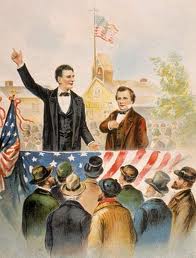March 28, 2012 Day 144
Math: 2 pages
LA book: 1 page
Lincoln & Douglas
6 x 6 read from Two Miserable
Presidents pages 16-top of 19, 27-31, and 35-36
Vocabulary
1. Kansas/ Nebraska Act of 1854: created the territories of
Kansas and Nebraska, opening new lands for settlement, and had the effect of
repealing the Missouri Compromise of 1820 by allowing settlers in those
territories to determine through Popular Sovereignty whether they would allow
slavery within each territory. The act was designed by Stephen Douglas of Illinois
2. Morality: conformity, or degree of conformity, to
conventional standards of moral conduct quality of being moral
3. Despotism: Absolute power and control, tyranny
4. Republican Party (when it began and what it stood for): one
of the two major political parties in the U.S.: originated 1854–56
5. Debates: A discussion as of a public question in an
assembly
6. “Fire-Eaters”: Southern democrats who were no longer
willing to compromise with the North
Sentences
1. Congress passed the Kansas-Nebraska Act in 1854 and
President Franklin Peirce signed it into law.
2. The question of morality was huge problem in the conflict
of slavery.
3. A quote by Abe Lincoln, “When the white man governs
himself, that is self-government; but when he governs himself and also governs
another man, that is more than self government, that is despotism.”
4. The new Republican Party had been founded in 1854, and it
opposed the expansion of slavery in the western territories.
5. “The only way to prevent states from becoming slave
states, Lincoln argued, was to stop the expansion of slavery right now;”
Stephen Douglas thought this was ridiculous and he said so over and over when
the two candidates met in a series of famous debates all throughout Illinois.
6. The fire-eaters rejected Stephen Douglas’s idea that
voters in western territories should vote on slavery.
People
1. Stephen Douglas: An American politician from Illinois who
designed the Kansas-Nebraska Act of 1854 and lost to Abraham Lincoln
2. Franklin Peirce: The 14th president of the
United States, signed the Kansas-Nebraska Act in 1854 allowing western
territories to vote on being a free or slave state
3. Mary Todd: Abraham Lincoln’s wife and 16th
first lady of the United States
4. Henry “Box” Brown: A famous slave in the North and south
who escaped from his plantation to the North on the Underground Railroad in
what was supposed to be an orange box
5. William Yancy: A fire-eater in Alabama who spoke to the
crowd of his opinion on slavery
6. John C. Calhoun: The 7th vice president of the
United States to John Quincy Adams, He is best known for his intense and
original defense of slavery
Facts & Details
1. After the Kansas-Nebraska Act was passed, southerners
from Missouri went to Kansas and voted illegally against slavery making Kansas
a slave state
2. Stephen Douglas’s nickname was the “Little Giant” based
on how he was little, and he had the powers of a giant in congress
3. Lincoln opened a debate in Illinois with one of his
famous quotes, “A house divided against itself cannot stand”
4. In 1860 leaders of the Democratic Party met in South
Carolina to choose their candidate for president, Stephen Douglas was surprised
when nominated
5. William Yancy’s quote, “What right of yours, gentlemen of
the North, have we of the south invaded?....Ours is the property invaded….ours
is the peace that is to be destroyed; ours is the property that is to be
destroyed ours is the honor at stake
6. In South Carolina, the south elected a president of their
own
Questions
1. Who was in the audience in Illinois when Douglas spoke in
defense of the Kansas/Nebraska Act? A: Abraham Lincoln
2. What happened when Kansas voted? A: The southerners in Missouri
came illegally and voted for slaves
3. What were Lincoln and Douglas’ nicknames? A: “Long Abe”
and “the Little Giant”
4. What does “a house divided cannot stand” mean? A: It
means that a country that is split in two will not work
5. What does “civil war” mean? A: a war between political
factions or regions within the same country
6. If someone asked you to describe what was happening in
the United States right before the Civil War, how would you answer? A: A big
debate against slavery that just kept getting worse, so bad that it led into
violence
Images







No comments:
Post a Comment